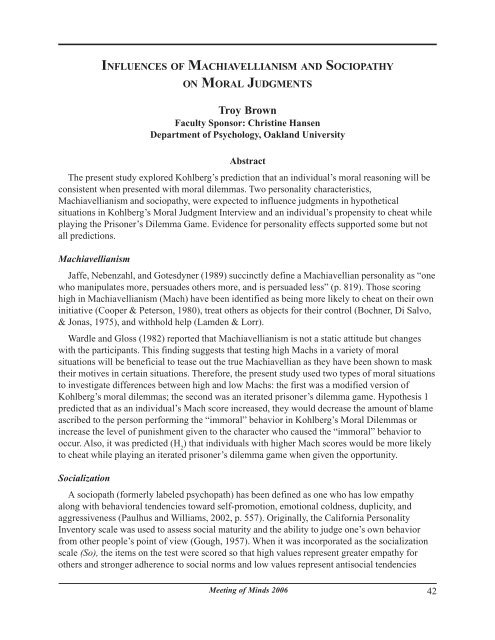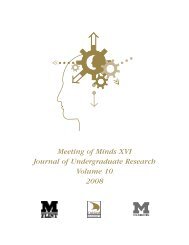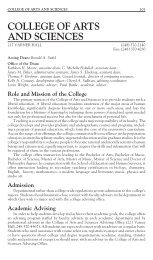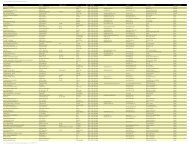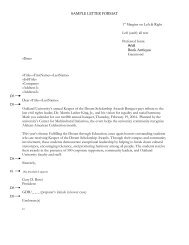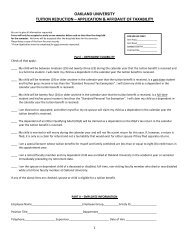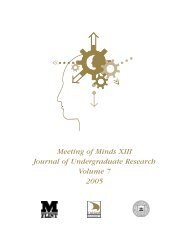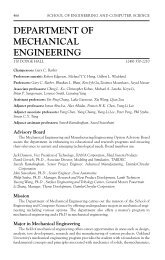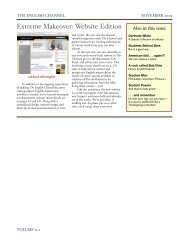MOM 2006 journal for pdf.pmd - University of Michigan-Flint
MOM 2006 journal for pdf.pmd - University of Michigan-Flint
MOM 2006 journal for pdf.pmd - University of Michigan-Flint
Create successful ePaper yourself
Turn your PDF publications into a flip-book with our unique Google optimized e-Paper software.
INFLUENCES OF MACHIAVELLIANISM AND SOCIOPATHY<br />
ON MORAL JUDGMENTS<br />
Troy Brown<br />
Faculty Sponsor: Christine Hansen<br />
Department <strong>of</strong> Psychology, Oakland <strong>University</strong><br />
Abstract<br />
The present study explored Kohlberg’s prediction that an individual’s moral reasoning will be<br />
consistent when presented with moral dilemmas. Two personality characteristics,<br />
Machiavellianism and sociopathy, were expected to influence judgments in hypothetical<br />
situations in Kohlberg’s Moral Judgment Interview and an individual’s propensity to cheat while<br />
playing the Prisoner’s Dilemma Game. Evidence <strong>for</strong> personality effects supported some but not<br />
all predictions.<br />
Machiavellianism<br />
Jaffe, Nebenzahl, and Gotesdyner (1989) succinctly define a Machiavellian personality as “one<br />
who manipulates more, persuades others more, and is persuaded less” (p. 819). Those scoring<br />
high in Machiavellianism (Mach) have been identified as being more likely to cheat on their own<br />
initiative (Cooper & Peterson, 1980), treat others as objects <strong>for</strong> their control (Bochner, Di Salvo,<br />
& Jonas, 1975), and withhold help (Lamden & Lorr).<br />
Wardle and Gloss (1982) reported that Machiavellianism is not a static attitude but changes<br />
with the participants. This finding suggests that testing high Machs in a variety <strong>of</strong> moral<br />
situations will be beneficial to tease out the true Machiavellian as they have been shown to mask<br />
their motives in certain situations. There<strong>for</strong>e, the present study used two types <strong>of</strong> moral situations<br />
to investigate differences between high and low Machs: the first was a modified version <strong>of</strong><br />
Kohlberg’s moral dilemmas; the second was an iterated prisoner’s dilemma game. Hypothesis 1<br />
predicted that as an individual’s Mach score increased, they would decrease the amount <strong>of</strong> blame<br />
ascribed to the person per<strong>for</strong>ming the “immoral” behavior in Kohlberg’s Moral Dilemmas or<br />
increase the level <strong>of</strong> punishment given to the character who caused the “immoral” behavior to<br />
occur. Also, it was predicted (H 2<br />
) that individuals with higher Mach scores would be more likely<br />
to cheat while playing an iterated prisoner’s dilemma game when given the opportunity.<br />
Socialization<br />
A sociopath (<strong>for</strong>merly labeled psychopath) has been defined as one who has low empathy<br />
along with behavioral tendencies toward self-promotion, emotional coldness, duplicity, and<br />
aggressiveness (Paulhus and Williams, 2002, p. 557). Originally, the Cali<strong>for</strong>nia Personality<br />
Inventory scale was used to assess social maturity and the ability to judge one’s own behavior<br />
from other people’s point <strong>of</strong> view (Gough, 1957). When it was incorporated as the socialization<br />
scale (So), the items on the test were scored so that high values represent greater empathy <strong>for</strong><br />
others and stronger adherence to social norms and low values represent antisocial tendencies<br />
Meeting <strong>of</strong> Minds <strong>2006</strong> 42


